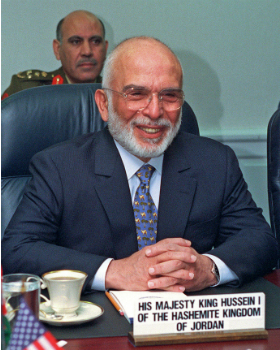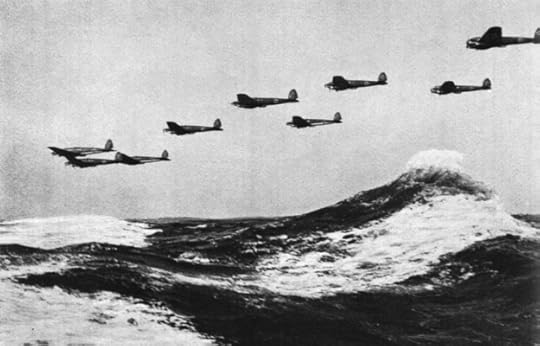Thomas E. Ricks's Blog, page 79
November 7, 2013
Time to regulate military speech and conduct offensive to gays and women

By
Rachel
Natelson
Best Defense guest columnist
Over two years after
the repeal of the Don't Ask, Don't Tell policy, a confluence of federal
legislation promises to test the military's commitment to upholding the rights
of LGBT servicemembers. In highlighting a growing tension between the
obligation of employers to accommodate religious needs and a parallel mandate
to prevent discrimination based on sexual orientation, the Employment
Non-Discrimination Act (ENDA) and the 2014 National Defense Authorization Act
(NDAA) together present a useful capsule of the emerging debate around how to
balance competing civil rights visions.
Currently headed for
the Senate after a series of committee reviews in the House, ENDA would
prohibit employment discrimination based on sexual orientation and gender
identity in most American workplaces. The bill is modeled after Title VII of the Civil Rights Act of 1964, and, as such,
contains parallel language regarding the distinct needs of religiously
affiliated organizations. However, while Title VII
simply permits religious organizations to give employment preference to members
of their own religion, ENDA would exempt these organizations altogether from
its purview, allowing religiously affiliated hospitals and universities to
discriminate against employees based on sexual orientation and gender identity.
Proponents of the exemption argue that in its absence, they would be required
to violate their religious beliefs by condoning homosexuality.
In addition to
animating policy debate, this tension between identity groups has also given
rise to disputes on the ground. At Hewlett Packard, for example, an employee
alleged that he was improperly terminated for failing to comply with the
company's anti-harassment policy when he refused to remove from his cubicle a
series of posters condemning homosexuality. The case reached a federal appeals
court, which found that he was not discharged due to his religious beliefs but,
rather, because he created a hostile and intolerant work environment for his
colleagues.
This distinction
between belief and conduct also informed a lower court decision concerning an
AT&T employee's refusal to sign an agreement obligating all personnel to
"recognize, respect and value" the differences among them. While the employee
in question was willing to certify that he would not discriminate against or
harass anyone, he maintained he could not "value" certain behavior without
compromising his own religious beliefs. The court agreed with his premise,
finding that the company could regulate the conduct, but not the beliefs, of
its employees.
A similar tone has
characterized discussions about how to reconcile the religious beliefs and
equality rights of military personnel. Following the repeal of Don't Ask, Don't
Tell, the Department of Defense issued a memorandum
outlining the impact of this development on specific policies within the
military. In addressing anti-discrimination policy, the Pentagon indicated
that, unlike race and gender, sexual orientation would not be deemed a
protected class for purposes of diversity programming, tracking initiatives,
and the Military Equal Opportunity program complaint resolution process.
Instead, grievances would be processed through individual commanders or
inspector general channels.
Almost three years
later, this informal approach to addressing discrimination may well be further
eroded by an NDAA amendment on religious accommodation for military personnel.
A provision in the House-passed act, authored by Rep. John Fleming (R-LA),
would amend an existing requirement to accommodate "the beliefs of a member of
the armed forces reflecting ... conscience, moral principles, or religious
beliefs," and instead mandate the accommodation of "beliefs, actions, and
speech." In prohibiting commanders from regulating even offensive speech or
conduct purportedly rooted in religious convictions, this provision is at odds
with the repeal memo's assertions that "[h]arassment or abuse based on sexual
orientation is unacceptable" and that servicemembers must "respect and serve
with others who may hold different views and beliefs."
Apart from
potentially sanctioning abusive conduct towards lesbian, gay, and bisexual
servicemembers, the Fleming amendment could also provide cover for
discrimination against other minorities in the military, including women
seeking access to reproductive care. At a moment when the Pentagon promises to
ease access to abortion care for rape victims, not to mention curtail the
underlying sexual violence giving rise to this need, the military can
ill afford to foster discrimination within its ranks. By regulating offensive
speech and conduct, as other employers have done, it can balance the rights of
religious members to maintain their beliefs with an equally compelling interest
in respecting the dignity of others.
Rachel Natelson is an attorney specializing
in the rights of military women. She has provided legal service to military
personnel for several years. She formerly served as the legal director of the
Service Women's Action Network (SWAN), where she managed the legal service
helpline. She is an
active member of the National Lawyers Guild's Military Law
Task Force.
November 6, 2013
Curb your enthusiasm!: Special Operations Forces should be niche units, not our foundational military assets

By Richard L. Russell
Best Defense guest columnist
We need to take a breath
and see Special
Operations Forces in context with the history and uses and limitations
of the threat, use, and management of force in American national security. Lest
we forget, Special Operations Forces are just that -- special. They provide unique, niche
military capabilities that place a premium on stealth
and clandestine operations. Yet many, if not most, demands for the threat and
use of American military might require that they be used openly and publicly. As
former head of Joint Special Operations Command Gen. Stanley McChrystal warned, "That's the danger of special operating forces. You
get this sense that it is satisfying, it's clean, it's low risk, it's the cure
for most ills. That's the way many new presidents are initially enamored with
the Central Intelligence Agency, because they are offered a covert fix for a
complex problem. But if you go back in history, I can't find a covert fix that
solved a problem long term."
These traditional
military capabilities, moreover, often are the foundations upon which
clandestine Special Operations Forces must launch their high-risk assaults. Delta
or SEAL teams might be dispatched into a building, for example, to kill or
capture a high value target. But the building's neighborhood would be secured
by larger, more traditional forces such as the Army Rangers. A SEAL team might
be dispatched across an international border to capture or kill a high value
target, but the base the team might be launched from and supported with
communications, command, control, and intelligence would come from more
traditional military forces.
The United States must
guard against gutting its traditional and foundational military capabilities
out of love of the glamour
for Special Operations Forces. The world today has a fair share of countries
with very capable niche or boutique-type military forces for special
operations. The Germans, for example, are known to have very capable hostage
rescue forces, while the Australians and the British have impressive special
operations forces that have been put to hard work in the Afghanistan and Iraq
military theaters. Yet the United States, with its global security interests,
could hardly afford to have its military mirror that of Germany, Australia, or Britain.
The United States,
moreover, will have to avoid the pitfall of growing its Special Operations
Forces too large. The Special Operations Forces community prides itself on
taking the most physically fit and intellectually nimble of the military duty
pool. But the faster and larger it grows, the lower the physical and
intellectual standards will go to bring down the overall quality of Special
Operations Forces.
Above all, Americans must
remember that our chief enemy -- al Qaeda -- for the past decade has been one
uniquely teed-up to be attacked by Special Operations Forces, whether in Iraq,
Afghanistan, Yemen, or the Horn of Africa. Al Qaeda in Iraq and Afghanistan or
the Taliban, like most terrorist organizations and insurgent groups, generally
recruit, train, organize, and plan operations in tight-knit cells and small
groups making them attractive targets for small Special Operations Forces. One
would prefer to dispatch a SEAL or Delta team against al Qaeda or Taliban cells
to try to capture individuals and to gather intelligence rather than to drop
payloads on them from a B-52 to destroy both individuals and documentation and
computers.
Notwithstanding common
wisdom today, our enemies of the future are likely to be nation-states as well
as traditional ideological insurgent movements like al Qaeda. For all of the
grave threats that al Qaeda has posed to the United States, we have to remember
that while its Islamic ideology has powerful appeal in the world today,
especially in the Middle East and South Asia, it still lacks the power of a
nation-state. Nation-states in contemporary international security remain the
pinnacle of power, and that's why al Qaeda has off and on wanted to gain
control in a nation-state -- whether Egypt in the 1990s or Saudi Arabia after
2003 and arguably Pakistan today. The United States needs to prudently guard
against al Qaeda remnants and successors, all the while mindful of the ebbing
and flowing of the international distribution of power among
nation-states.
Because Special
Operations Forces typically are small and lightly armed and protected they
require stealth and clandestine operations for their protection. If they are
behind enemy lines and detected by regular forces they will be in a "world of
hurt." Special Operations Forces have ably gone behind enemy lines in Iraq to
knock-out critical Iraqi radars to create blind spots for the Army invasion of
Kuwait in the 1990-91 war. But Kuwait was liberated by traditional military forces,
not Special Operations Forces in 1991, just as Saddam Hussein's regime was
ousted by the 3rd Infantry Division in 2003, not by a SEAL or Delta team.
In sharp contrast, a
great many types of operations require that forces be seen and heard. Overt
military capabilities of traditional air, land, and sea power are required to
deter nation-states from launching open warfare. The United States, for
example, to deter any future Chinese military moves against Taiwan, has to have
its air, naval, and land forces seen in and around the Taiwan Strait and Asian
theater to have any deterrent effect. Should Chinese forces one day not be
deterred by American forces in Asia from taking Taiwan, Special Operations
Forces certainly would not be able all by [themselves] to dislodge Peoples'
Liberation Army forces from occupation of the island. For that type of mission,
the United States would have to call in the Marines for amphibious operations,
whether against Taiwan directly or elsewhere in Asia as diversionary or
retaliatory operations against the Chinese, or call on the Army Rangers to
retake and secure Taiwanese airbases in order to hustle in larger army forces
on board U.S. Air Force combat flights.
Special Operations Forces
wonderfully augment naval capabilities for protecting sea lanes of
communications. They have performed admirably, for example, over decades
battling Iran's irregular Revolutionary Guard Forces harassing maritime traffic
in the Persian Gulf or with sniper operations to kill Somalia-based pirates
before they could execute their civilian captives on the high seas. But these
Special Operations Forces in and of themselves could not protect and keep open
the sea lines of communication in critical choke-points, whether in the Middle
East at the Red Sea or the Strait of Hormuz, or in Asia at the Strait of
Malacca.
Traditional naval forces
will carry out the lion's share of the burden for these critically important
defense missions. If, one future day, the Chinese tap their growing submarine
capabilities to wage a campaign to cut American sea lanes of communication with
security partners in Japan, Australia, South Korea, and Taiwan, U.S. Special
Operations Forces would be no substitute for American attack submarine capabilities
to escort shipping convoys -- much like was done in the Atlantic during both
the world wars -- as well as for hunting Chinese predatory submarines.
The United States, too,
will need an overt and modern nuclear triad of aircraft, ballistic missiles,
and submarine based nuclear weapons to maintain a deterrent posture against
growing Chinese strategic nuclear forces. A robust American nuclear posture
will be needed to deter China's growing nuclear forces. The United States
reluctantly will be sliding toward a mutual-assured-destruction posture with
China reminiscent of the one it had and still has, even if not as pronounced
with the Soviet Union during the Cold War and with Russia today. China could be
deterred by American nuclear forces from using its own nuclear forces, but not
from the threat of Special Operations Forces retaliatory strikes against
Chinese assets.
Likewise, to compel or
coerce a nation-state adversary to change his behavior requires the overt
threat or application of military power. That military power is to be exerted
until the enemy changes the offending behavior or he will risk receiving
additional military strikes. The United States and allies applied coercive
military power to Serbia in 1999, for example. The United States applied
airpower to Serbia and Serb forces in Kosovo and, with the pushing of the
British, was on the cusp of escalating to the insertion of ground forces to
compel Slobodan Milosevic to stand down his ruthless military and paramilitary
campaign in Kosovo.
The bottom line is that
Special Operations Forces in the American military arsenal have been and will
continue to be unique and niche "force multipliers." But as we enter an era of
increasing budgetary demands to make trade-offs and make ends and means match in
our defense strategy, we have to remember that Special Operations Forces, as
important as they are, are often more akin to dessert than to a main course. If
we load up too much on the dessert in our future defense posture, we will wind
up fat in the wrong places, and without the military muscle needed to wage
future war.
Richard L. Russell
is a professor of
national security affairs at the National Defense University's
Near East and South Asia
Center for
Strategic Studies. He received his doctorate in foreign affairs from the
University of Virginia, and previously served as a political-military analyst
at the Central Intelligence Agency. The views expressed are those of the
author
alone and do not reflect
the policy or position of the U.S. government, the Department of Defense, or
the National Defense University.
Fromkin on the change in the historical outlook of people in recent centuries, plus Howard on the advent of modern armies

In David Fromkin's
very interesting Europe's
Last Summer: Who Started the Great War in 1914?, I was struck by this aphoristic observation: "Before the nineteenth
century began men had looked backward to a golden age. Now they looked forward
to it."
It
made me think somehow of Michael Howard, who in War in European History makes
the point that around the beginning of the 20th century, two non-European
powers (the United States in 1898 and Japan in 1904) defeated European powers
(Spain and Russia).
A
third jump: Howard also says in that book that the first modern army, which he
defines as combining infantry, artillery, and cavalry, appeared in 1494. That
would mean we are just past 500 years into "modern military history."
I
am not sure what all this means. But I do like writers who are not afraid to
make bold, sweeping assertions that almost have the quality of aphorisms. It
seems to me the opposite of the academic fashion of making points as small and
tentative as possible. "Initial research indicates that Confederate brass
buttons may have declined in quality with the passage of time midway during the
Civil War, at least in the eastern theaters of operations, but the evidence
from west of the Mississippi is less conclusive. More study is needed."
Comment of the day: Did U.S. military involvement in the ME begin with defense of Jordan's king from PLO in 1970?

So suggested "Outlaw9" in a recent comment. Very interesting. I hadn't heard of this before. I knew SF
trainers were active, but did that become SF shooters? Anyone got more?
November 5, 2013
'Moment of Battle': An old school approach to military history, but still fun

Lately I've been
dipping into parts of Moment
of Battle: The 20 Clashes that Changed the World, by James Lacey and Williamson Murray, who
is co-author of one of my favorite books about World War II.
It's an old school
approach -- decisive battles and great men. But it is even more anachronistic
than that, because it really is about the battles that shaped the modern West.
Of the 20 globe-molding clashes, eight involve the English, and five involve
the Americans. Apparently, China, South America, and Africa never had a
decisive battle worth including (except for Romans fighting in Mediterranean
Africa). South Asia, too, except for Dien Bien Phu.
That aside, it is
fun to read, partly for battles about which I know nothing (Yarmuk, Zama), and
partly for new takes on familiar fights. Things I didn't know about the Battle
of Britain include that pilots flying for the U.K. did up to five combat
sorties a day. Also, the leading ace of the battle was not British, but a Czech
named Josef Frantisek. He shot down a total of 40 German aircraft before being
killed on Oct. 8, 1940. Other foreigners flying for the RAF included 141 Poles,
129 New Zealanders, 90 Canadians, 87 other Czechs, and 7 Americans, only one of
whom survived World War II.
Still, this book
makes me think there is a good follow-up book to be done: Twenty Non-Western Battles that Helped Shape the World. What
battles would such a book cover? Bonus points for clashes that don't include
Western powers.
Bonus oddity: The jacket cover was
designed by one Carlos
Beltran. Busy guy!
I was surprised to see Google getting down with Marine Corps intelligence

Given the recent blowup between the U.S. government and the Google/Microsoft complex over
transparency in intelligence matters, I was interested to see that Google now
sponsors two annual awards for Marine Corps intelligence specialists. Sgt.
Manuel Iles won "Language Professional of the Year," and Capt. Jesse Sloman won
an award for "Literary Excellence." What is Google doing for the Corps, I
wonder? I searched online for information about a contract but failed to find
anything illuminating.
I wonder if one day
Google or another such company will be the biggest U.S. military contractor.
After all, a century ago, no one had ever heard of Boeing, Lockheed, or General
Dynamics.
The iPhone defined?

My friend Doug, the Ollivant
in the room at New American Foundation, says that a hacker friend told him that
"an iPhone is a tracking and surveillance device from which
you also happen to be able to make calls."
November 4, 2013
Is the Marine Corps Gazette coming out in opposition to the Marine commandant?

Yow.
That's like the Jesuits denouncing the Pope, isn't it?
That's
the thought I had as I read the November issue of the Gazette (yes, pointedly, the birthday ish). First, the editorial in
the front, signed by the magazine's editor, retired Col. John Keenan, calls out
the commandant by name for giving detailed specifics on how he wants commanders
and NCOs to operate. "Gen. Amos delineates numerous policies that are detailed
and very prescriptive.... When the Commandant cannot rely on commander's intent
and mission orders with general and commanding officers, but instead has to
tell them not just the end state but the ‘how' with the detail of a kneeboard
checklist, it makes one wonder."
Now,
that can be read two ways, either as a slam on the leader or the led, so I
wasn't sure quite where Col. Keenan was going. But then, further into the issue,
I read an article by Maj. Randall Turner that criticized the commandant's
emphasis on diversity in the Corps' officer corps: "The Commandant chances
dissension by inadvertently but tacitly promoting a quota system."
On
the one hand, it is good to see strong, clear arguments being made. The Gazette seems to be regaining its
independent, open-minded footing. On the other hand, it makes me wonder, again:
What is going on in the Marine Corps? This doesn't feel to
me like the usual post-war "morning after" letdown. More like a crisis of
confidence in the institution itself.
A
couple of other things that struck me in this issue.
The
birthday letter from the commandant states that, "We have always known
hardship, fatigue, and pain ... but we have never known what it is to lose a
battle!" Really, Gen. Amos? (Now I'm
doing it.) I immediately thought of the Chosin campaign in late 1950:
Brilliantly fought and led, but not something one can call a victory.
The
November issue also had the usual ration of Marines bashing American society.
The Corps seems to eat up this moral junk food. For example, there is a
reference to "our fellow citizens" as "more timid and protected souls," which
struck me as a pretty broad brush. (On the other hand, I did like another
sentence in the same article: "In our remembering, let us turn from mourning
that which we cannot change to celebrating that which we have experienced.")
Later
in the issue, but in the same America-bashing vein, Lt. Col. Jeffrey Pellegrino
asserts that, "Society holds tolerance as its highest value, which in turn
spawns its own set of societal norms, specifically, legalism, conformity and
instant gratification. These norms, if not held in check, often lead to
alcoholism, drug abuse and rape, as can be seen increasing throughout society
today." Yow, LTC! That's a whole lot of assertions to make, some of them pretty
sweeping -- and not a single bit of supporting evidence introduced. It is, at
best, a controversial assertion (I mean, tolerance causes rape?) but in no way
a set of self-evident truths. The Best Defense
verdict: This is just intellectually sloppy, the mental equivalent of a
Marine appearing in public bleary-eyed, shaggy-haired and unshaven, with his
uniform messed up and whiskey on his breath. Take it home and clean it up.
That
said, if the mission of the Gazette
is to make its readers think, and I suspect it is, then the bottom line on the
November issue has to be: Congratulations to Col. Keenan and his team.
Gourley on Iraq: It ate a big part of my life, but I just don't care about it anymore

From a comment the other day. I think this is actually a healthy attitude,
one I wish I could emulate more:
I don't care. And it's not that I
just don't care. It's that I deliberately and genuinely don't care. I don't
know exactly when, but it occurred to me in that moment that, at some point
along the line, I made the considered decision to stop caring about Iraq, its
people, and their collective fate. If the headline had been "Iraq
disappears into gigantic middle eastern sinkhole," I might have read the
rest. But it would only have been out of curiosity of what geological
phenomenon caused it.
This is odd to me, because I care
about a lot of things. I care about the debt. I care about the state of our
armed forces. I care about our veterans. I care about the surveillance debates.
Heck, when the Jehovah's witnesses showed up at my door this morning I gave
them 15 minutes of my time because they were at least making an effort at
improving the world, and I felt that as a human being I owed them at least a
demonstration of respect for that. I read the news, I write my Congressman, I
take part in charity, I write books and articles. I care about lots of
things.
But not Iraq.
Spent two years there. Lost friends
there. Lit fire to my first marriage there. Temporarily loaned it my sanity. If
my life was a pie chart, Iraq would still represent a pretty huge chunk. And I
do not care about that place. I tried to consider today that my indifference
may contribute to future problems there, the consequences of which range from
regional instability and the deaths of innocents to a full-blown Iranian proxy
with as much enmity for the U.S. as Bin Laden's Afghanistan. And I still
couldn't muster any concern.
I don't know if the relationship at
this point is framed more by all that I did give to it, the utter lack of
return gained on the investment, or the political fool's errand underlying the
whole thing. I care about Afghanistan, though I never went. Maybe I'll care
less about that when we're finally out of there. I care more about Egypt, too.
Maybe that's what really puts it into relief. I perceive that, at least in
Egypt, the masses are willing to unify and work and fight to secure for
themselves the basic liberties and rights they want. The reality isn't without
its impurities, I know, but I feel like the Egyptians collectively work harder
than the Iraqis. I respect the Egyptians. By and large, I never felt anything
but pity for the Iraqis. And honestly, I think ten years is long enough to pity
anyone. I don't wish them ill, but if ill is visited upon them and they do
nothing about it, then I won't bother myself with it. I certainly won't spend
pages and pages pondering what America can do to prop them up.
For guys like Petraeus, they can't
put it down because their careers and legacies are too intertwined. The state
of Iraq's government in twenty years will be the post-script to whatever
biographies anyone else writes about him. So, for him, he is still very much at
risk in that country, and has much at stake to lose. Maybe that connection is
why I regarded his essay the same way I did this news. I made note of it, but I
didn't bother to read it. He's just the sound to accompany the country's
fury.
I know it's the duty of people like
Tom to report on these events, and I don't get angry with them for doing it.
But what I simply cannot relate to is any sense in the reporting that there is
something genuinely at stake. The foreboding that Tiny Tim's chair will soon be
empty if events go unchanged falls flat with me. It all sounds like they're
saying "this is my chair that's about to go empty," and all I can
think is that I have a whole dining room set, so why should I wring my hands
about theirs?
I wonder how many other people feel
the same way. I talk to other vets a lot. They have stuff they care about:
government reform, militarized law enforcement, post-war military readiness.
But now that I think about it, they don't talk about Iraq. Maybe they don't
care, either.
Army boots Camp Zama commander

He
was bounced on the usual charge of
"lack of confidence." Army declines further comment, citing privacy concerns. I
wonder whether such concerns are legitimate. After all, these are public
positions, funded by the taxpayer. If a senior government official is removed,
isn't the public entitled to know the reason why?
Also,
I wish that Army public affairs officers would stop
thinking it is cute to release bad news late on Fridays. It is not.
Thomas E. Ricks's Blog
- Thomas E. Ricks's profile
- 436 followers



